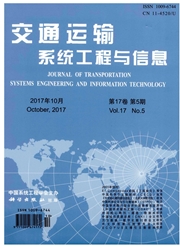

 中文摘要:
中文摘要:
为了全面描述决策者在不确定环境下的出行行为,从价值变化和可靠性变化两个方面研究通勤者的路径选择行为及对待风险的态度,提出了基于累积前景理论(CPT)的通勤者路径选择模型.首先推广了两个参考点的CPT,接着根据不确定理论对行程时间进行预算,给出通勤者参考点估计的统一方法,然后构造通勤者的路径选择模型.最后在一个测试网络上研究可靠度与参考点及可靠度与累积前景值的关系.结果表明,通勤者的参考点可以根据可靠度要求动态设置.出发时刻相同,出行者可靠度要求较高时,风险较低的路径前景值较大;反之可靠度要求较低时,行程时间平均值较小,虽然风险较高的路径前景值也比较大,这一结论与事实相符合.本文所提出的决策模型能够有效地描述通勤者在随机路网中的路径选择行为.
 英文摘要:
英文摘要:
So as to describe travel behavior of decision makers under uncertain environment comprehensively and study route choice behavior and risk attitude of commuters from value variation and reliability variation, a route choice model for commuters based on cumulative prospect theory(CPT) is proposed. Firstly, CPT with two reference points is generalized. Then, travel time is budgeted according to uncertain theory, and on the basis of the budget travel time, a unified method for estimating commuters' reference point is presented. And then, a route choice model for commuters is established. At last,relationship between reliability and reference point and relationship between reliability and cumulative prospect value are studied on a test network. The results show that commuters' reference point can be set dynamically according to their requested reliabilities. When departure time is same, and when a traveler has a higher requested reliability, a lower risk path has a larger prospect value; whereas when a traveler has a lower requested reliability, a path with smaller mean travel time and although with a higher risk also has a larger prospect value. It is consistent with the fact. The proposed decision model can describe route choice behavior of commuters on random road networks effectively.
 同期刊论文项目
同期刊论文项目
 同项目期刊论文
同项目期刊论文
 期刊信息
期刊信息
